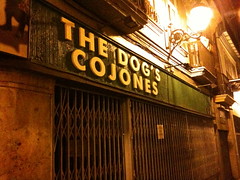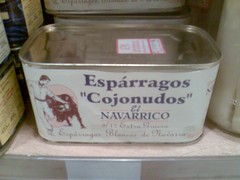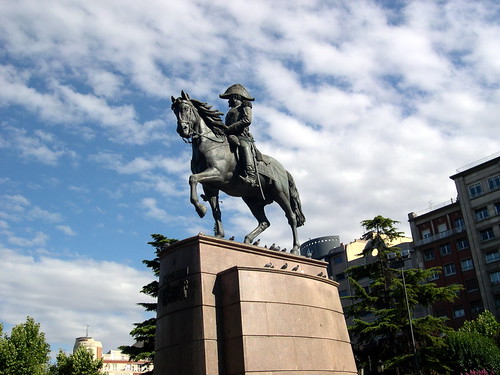According to the Royal Spanish Academy a cojón is a testicle and cojones is an interjection used to express diverse moods, especially surprise, something odd or anger. This a polite way of translating cojones. The Real World Spanish translation is a guy’s nuts or balls.
The renowned Spanish author and journalist Arturo Pérez Reverte wrote the column Cuestión de cojones in 1998 for El Semanal newspaper. In this column, published as a response to a letter sent by a furious reader, he makes reference to an anonymous manuscript called Riqueza del Castellano (The Richness of the Spanish Language). It turns out that this text is a thesis about the different uses and meanings of the word cojones.
Fourteen years later on February 2012, radio station Onda Cero revived the audio of this famous script and transform it to a useful video. For the benefit of the Speaking Latino readers, we have broken down the content of the video in segments and translate the different meanings of cojones to English.
The Richness of the Spanish Language
Video transcript translation:
Now I understand the complaints of foreigners because of the difficulties they have with the different meanings of a word in Spanish. An example of the richness of the Spanish language is the variety of meanings from one simple word, like the well-known and frequently-used to make reference to the “masculine attributes” COJONES.
A. Cojones used together with a number (Time 0:35)
1. Un cojón = expensive (Ex. Valía un cojón)
2. Dos cojones = brave (Ex. Tenía dos cojones)
3. Tres cojones = to not care (Ex. Me importa tres cojones)
4. Un número muy grande más la palabra “par” (a large number plus the word pair) = difficult (Ex. Lograrlo me costó mil pares de cojones) This is similar to “I told you a million times.”
B. When cojones is used as a verb (Time 0:52)
5. Tener (cojones) = to be brave (Ex. Aquella persona tiene cojones)
6. ¡Tiene cojones! = expression of surprise
7. Poner (cojones) = to lay down a challenge (Ex. Puso los cojones encima de la mesa)
8. Me corto los cojones = a bet or challenge to someone similar to “I swear on my mother’s grave” but literally translated as “I’ll cut my balls.”
9. Te corto los cojones = a threat to someone, literally “I’ll cut your balls.”
 The verb tense changes the meaning (Time 1:12)
The verb tense changes the meaning (Time 1:12)
10. Present tense = bothersome (Ex. Me toca los cojones)
11. Reflexive = laziness (Ex. Se tocaba los cojones)
12. Imperative = surprise (Ex. Tócate los cojones)
Cojones with a prefix or suffix (Time 1:27)
13. acojonado = scared
14. descojonado = die laughing
15. cojonudo = perfection
16. cojonado = indolence
Cojones with prepositions (Time 1:38)
17. De cojones = success (Ex. Me salió de cojones)
18. De cojones = a whole lot of (Ex. Hacía un frío de cojones)
19. Por cojones = willingly, forcibly (Ex. Lo haré por cojones)
20. Hasta los cojones = up to here o fed up (Ex. Estoy hasta los cojones)
21. Con cojones = brave, courageous (Ex. Era un hombre con cojones)
22. Sin cojones = cowardly, literally “without balls” (Ex. Era un hombre sin cojones)
Color, form, condition and size have different meanings (Time 1:58)
23. Color: Purple = cold (Ex. Se me quedaron los cojones morados)
24. Form: Square = tired (Ex. Tenía los cojones cuadrados), literally “Had square balls.”
25. Condition: Worn Out = experience (Ex. Tenía los cojones pelados de tanto repetirlo)
 Cojones size and position is important (Time 2:13)
Cojones size and position is important (Time 2:13)
26. Tiene los cojones grandes y bien plantados = Has large and well-positioned nuts.
27. Tiene los cojones como los del Caballo del Espartero = Has the balls like the Espartero horse. The phrase refers to an equestrian monument in honor of General Espartero in Madrid (seen in the opening photo of this post). There are other sayings that make reference to the size of the testicles of the horse and refer to bravery and courage. Those sayings are tienes más huevos que el caballo de Espartero and le ha echado más huevos que el caballo de Espartero with huevos in both cases being another slang term for balls.
But don’t exaggerate the size of the cojones because it may also be negative:
28. Le cuelgan (los cojones) = clumsiness, literally “his balls hang”
29. Se pisa (los cojones) = laziness, literally “steps on his own balls”
30. Se sienta (en los cojones) = vagrancy, literally “he sits on his own nuts”
Cojones used as interjection (Time 2:30)
31. ¡cojones! = surprise
32. ¡manda cojones! = shock, surprise
33. Me sale de los cojones = because I say so (in giving orders, for example)
So, in about three minutes this video gave you 33 phrases using the word cojones. What other phrases with cojones are used in your country? Do you think that cojones is the most diverse word in Spanish? What about chingar in Mexico, huevear in Chile and vaina in Dominican Republic?
And finally, thank you to Natalia Fuentes (email: nfuentes@norintal.com), our resident Expert on Spanish from Spain for working through this with us.
Check out these other Spain Spanish Slang Word articles.
Photo credit: Estatua dedicada al General Espartero by horrapics via flickr
